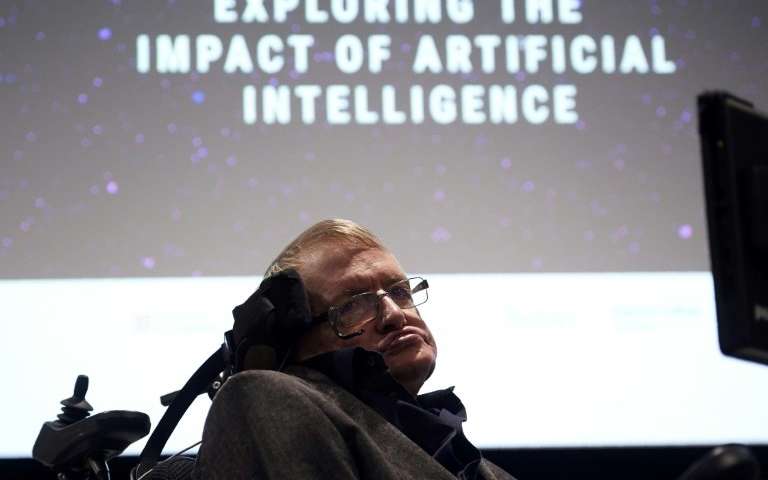
World dignitaries, celebrities and academics on Wednesday mourned Stephen Hawking, the British physicist who died aged 76 after a cosmic career in which his mental genius transcended his physical disability to probe the secrets of the universe.
Propelled to stardom by his 1988 book “A Brief History of Time”, an unlikely worldwide bestseller, Hawking’s genius and wit won over fans from far beyond the rarefied world of astrophysics.
As a scientist he earned comparisons with Albert Einstein and Isaac Newton.
Hawking died peacefully at his home in the British university city of Cambridge in the early hours of Wednesday morning. A university source told AFP that his health deteriorated around Christmas time.
“We are deeply saddened that our beloved father passed away today,” Hawking’s children, Lucy, Robert, and Tim said in a statement.
“He was a great scientist and an extraordinary man whose work and legacy will live on for many years.”
‘We will miss him forever’
Queen Elizabeth II sent a message of condolence to Hawking’s family, Buckingham Palace said. Prime Minister Theresa May praised the scientist as “a brilliant and extraordinary mind” on Twitter.
Tearful well-wishers lined up at the University of Cambridge’s Gonville and Caius College, where Hawking was a fellow for more than five deacades, to sign a book of condolence.
“So many people have come to pay tribute to #StephenHawking we’ve increased the books of condolence to four. Many beautiful and moving messages,” the college wrote on Twitter.
Professor Didier Queloz, an astrophysicist and colleague of Hawking’s, told AFP that he was “an extraordinary person to meet”.
Hawking defied predictions that he would only live for a few years after developing a form of motor neurone disease in his early 20s.
The illness gradually robbed him of mobility, leaving him confined to a wheelchair, almost completely paralysed and unable to speak except through his trademark voice synthesiser.
“His courage and persistence with his brilliance and humour inspired people across the world,” his family said.
“He once said, ‘It would not be much of a universe if it wasn’t home to the people you love’. We will miss him forever.”
A titan of science
Born on January 8, 1942—300 years to the day after the death of the father of modern science, Galileo Galilei—Stephen William Hawking became one of the world’s most well-regarded scientists and entered the pantheon of science titans.
His death was announced on the 139th anniversary of the birth of Albert Einstein.
Hawking had an enduring fascination with the mysteries of black holes.
His work focused on bringing together relativity—the nature of space and time—and quantum theory—how the smallest particles behave—to explain the creation of the Universe and how it is governed.
“My goal is simple,” he once said. “It is complete understanding of the universe, why it is as it is and why it exists at all.”
But he was also a beloved figure in popular culture, with cameos in “Star Trek: The Next Generation” and “The Simpsons”. His voice appeared in Pink Floyd songs.
“Have fun out there among the stars,” former US president Barack Obama wrote on Twitter alongside a photo of him with Hawking.
NASA issued its own Twitter eulogy, publishing a video of the scientist grinning as he soared into weightlessness on a zero gravity flight at the Kennedy Space Center in Florida, escaping his wheelchair for a brief period.
His international reach was demonstrated in China, where news of his death generated nearly half a billion clicks as fans bade farewell on social media platform Weibo to a “giant star”.
Marriages
Hawking’s first marriage to Jane Wilde in 1965 gave him three children and was immortalised in the 2014 film “The Theory of Everything”.
Eddie Redmayne, who won an Oscar for his lead role in the film, said Hawking was “the funniest man I have ever had the pleasure to meet.”
The couple split after 25 years and Hawking married his former nurse, Elaine Mason, but the union broke down amid allegations that he was being abused. He refused to comment.
Hawking became one of the youngest fellows of Britain’s most prestigious scientific body, the Royal Society, at the age of 32.
In 1979 he was appointed Lucasian Professor of Mathematics at Cambridge University—a post previously held by Newton.
Hawking was an outspoken commentator on life back on earth, voicing his disapproval in recent years of both the election of Donald Trump in the United States, and Britain’s vote to leave the European Union.
He also commented on the future of technology, warning that “the development of full artificial intelligence could spell the end of the human race”.
Despite being a prominent atheist, Hawking met with four popes, and the Vatican issued a statement saying it was “deeply saddened” by the news of his death.
Hawking, it said, had always “wanted to advance the relationship between faith and scientific reason”.

